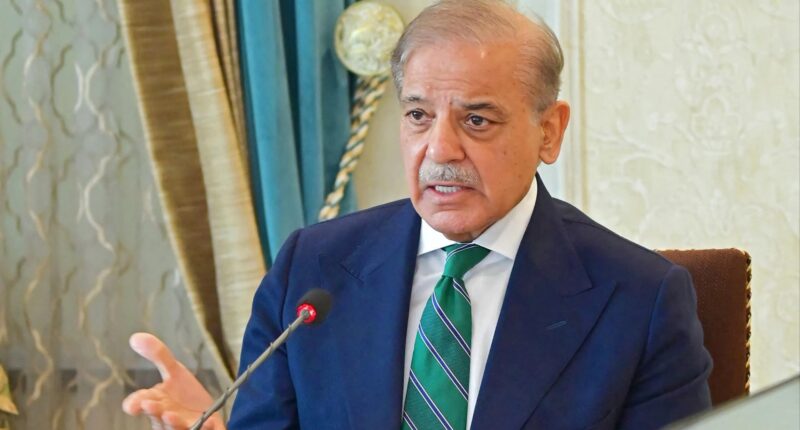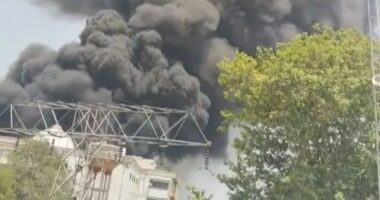AS if the world isn’t racked by enough conflict, war between two nuclear-armed states has just broken out.
India carried out air strikes on Pakistan in response to a terrorist attack in Kashmir on April 22, bringing concerns of a possible nuclear conflict.



Pakistan has vowed revenge for the bombardment, further ratcheting up tensions.
World War Three may loom if allies of these two bitter rivals decide to join in.
China is Pakistan’s key backer and already in dispute with India over their common border.
Donald Trump is a vocal “friend” of India’s Prime Minister, Narendra Modi.
It is crucial to understand the gravity of the situation and the potential impact on innocent civilians, even if major world powers are not directly involved in the conflict.
Gunned down
Pakistan is a big country, but dwarfed by India.
More than 250million people live in Pakistan but they are hugely out- numbered by India’s 1.5billion.
India has edged ahead of China as the world’s most populous country.
India also has a much bigger economy and more developed IT and scientific sector.
It is far ahead of Britain, for instance, in space exploration.
The Indian flag has made it to the moon before the Union Jack — or Pakistan’s.
This imbalance is the core reason why Pakistan has devoted so many resources to its military sector and making its own atomic bomb.
Despite focusing heavily on defense, Pakistan’s economic progress has been hampered. The country’s military often garners public support by highlighting perceived threats from India, Iran, and Afghanistan.
Pakistan’s insecurity means its generals are the real rulers of the country.
But politics is too important to be left to them.
Their blinkered way of looking at their country’s problems from inside a bunker is not wise.
Its chief of army staff General Asim Munir made a speech saying how Muslim Pakistanis were different from Hindus “in every possible aspect” just days before the April 22 terror attack.
Regarded as his nation’s most powerful man, the general referred to Kashmir as Pakistan’s “jugular vein” and vowed to “never abandon Kashmiris in their heroic struggle against Indian occupation”.
Indians remembered those words when 26 innocents enjoying Kashmir’s mountain beauty were gunned down five days later.
Most were Hindu tourists.
The terrorists wanted to cause mayhem.
They’ve got it.
Their atrocities against unarmed civilians were meant to cause an overreaction by India.
And those behind the April 22 outrage couldn’t care less that innocent civilians in Pakistan have been killed in the reprisals.
They want a cycle of revenge to force the Pakistanis to fully back their cause.
Bad blood is flowing between them. Neither wants to be seen to back down.
Mark Almond
India’s Prime Minister Modi wanted his country’s forces to carry out the kind of swift punitive raid against Islamic insurgents on the North-West frontier that the British ordered when ruling the sub-continent from the same government offices in New Delhi decades earlier.
Pakistan said 26 people were killed in the Indian air strikes and shelling.
Meanwhile, India reported that ten of its civilians were killed by Pakistani shelling on its side of the border in Kashmir.
By extending the range of operations from the Pakistani half of Kashmir to military bases and what it said were “terrorist training camps” in Pakistan itself, India risks an open-ended war.
If this shooting match drags on, other states including China, Iran or even the US could get drawn in.
What we are witnessing is a real-time test of whether nuclear deterrence works in a crisis.
Can two nuclear-armed states shoot at each other while stopping short of mutual annihilation?
These awesome fears seem a world away from Tuesday’s upbeat announcement of a trade deal between the UK and India.
Yet war between India and Pakistan could stir up trouble here between Hindus and Muslims whose families originated in the sub-continent.
In 1990, veteran Labour politician Roy Hattersley told me that Kashmir was the main subject of letters from his Birmingham constituency.
Personal survival
So tensions over the disputed region have long been stirring up emotions here WITHOUT turning into sectarian conflict.
Let’s hope that remains so.
Our Foreign Office is trying to mediate between the two warring Commonwealth countries.
That’s not going to be easy.
Bad blood is flowing between them.
Neither wants to be seen to back down.
Being seen to be the loser could be fatal to Mr Modi’s premiership in India, but Pakistani politics is even more brutal.
During the Pakistani prime minister’s defiant speech to its parliament yesterday, the camera lingered on a young Bilawal Bhutto Zardari, whose mother — the former PM Benazir Bhutto — was murdered, and his former president grandfather, Zulfikar Ali Bhutto, hanged.
When war becomes a matter of personal survival for politicians and generals, going too far to save oneself becomes a real risk.
Statesmen avoid getting into that position.
India and Pakistan’s leaders are now locked in a perilous tit-for-tat military exchange.
Let’s hope they put the common good first and blink before it’s too late.

















